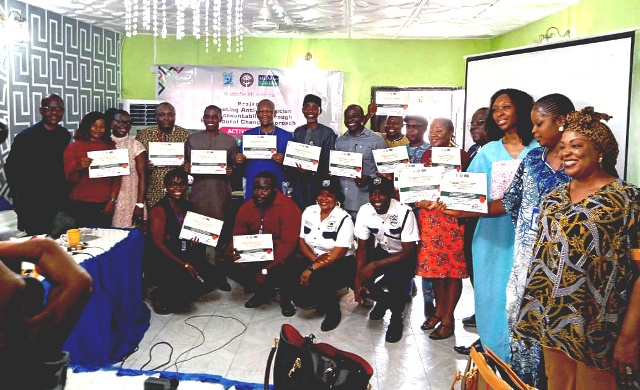
By Magnus Effiong
With corruption and lack of accountability, especially by political leaders, becoming dreadful monsters in the country, an interfaith organisation, under the aegis of Inter-religious Coalition Against Corruption in Nigeria, and the media have brainstormed on how best to tackle the monsters headlong.
In a one-day symposium in Calabar with the theme ‘Using Conventional Media Platforms to Promote Accountability and Anti-Corruption in Nigeria,’ Journalists and the Coalition, which is sponsored by MacArthur Foundation, explored ways of using the wide platforms and credibility of conventional media to promote accountability and intensify anti-corruption crusade.
The summit argued that the culture of transparency and accountability could be established in the subconscious minds of Nigerians if the media would intensively investigate and report cases of corruption with boldness and educate the public on its ills.
It noted further that with such approaches from the media, supported by religious organizations and traditional institutions, corruption could be tackled and reduced.
Speaking, one of the Coordinators, Bishop (Dr)Emma Isong, who represented the Christian faith, said “the greatest disease or caterpillar eating up the fabrics of the Nigerian polity is corruption, and this is affecting our economy. All hands must be on deck, the religious leaders, traditional leaders, the media and indeed all Nigerians must come together and fight corruption and lack of accountability in governance.
“The media should help us blow the trumpet on these anomalies and should refuse to be used by corrupt politicians. Religious leaders should also inculcate anti-corruption messages into their sermons in Churches and Mosques.”
Isong, who is also the national publicity secretary of the Pentecostal Fellowship of Nigeria (PFN) and Presiding Bishop of the Calabar-based Christian Central Chapel Int’l (CCCI), said “we could overcome corruption if we imbibe the seven pillars of National Ethics and Integrity Policy (NEIP) which are human dignity, voice and participation, patriotism, personal character/responsibility, integrity, national unity and professionalism.”
On his part, Imam Abdulkareem Shefiu, one of the Coordinators who represented the Muslim faith, said “Conventional media is critical in moulding behavioral change with the religious and traditional leaders playing great roles too.
“And, because the media influences people’s mentality, we are calling on them to step up their watch-dog roles with investigative reporting. The anti-corruption messages should get across to the Nigerian people, and we cannot do this in our Churches and Mosques alone.”
In a keynote address, a resource person, Engr Wisdom Akwari, advised that for media reporting and journalism to play an effective role in corruption detection, the media has to be free and independent.
He said the fight would become easier if the Freedom of Information (FOI) laws were made fully operational, therefore advised owners of media houses to avoid undermining anti-corruption efforts to protect their political interest.
“There can never be objective journalism and accurate information dissemination that will lead to accountability and anti-corruption if there is no freedom of press, when the owners of the media are in positions of political authority and when there are threats on the lives of the media members.
“It is therefore recommended that freedom and independence of press should be a major policy issue in Nigeria and owners of conventional media should not be people in positions of authority,” he posited.





